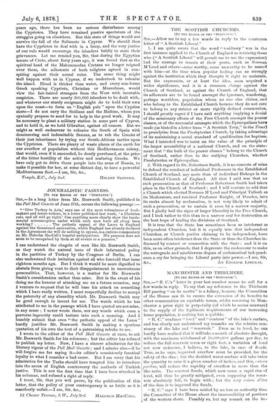LETTERS TO THE EDITOR.
THE FUTURE OF CYPRUS.
(TO THE EDITOR OF TEl `. SPECTATOR:1
Stn,—In your number of June 29th there is a clever and sugges- tive article upon the possible annexation of the Island of Cyprus- by the British Crown. Surely the calm and liberal-minded Spec- tator cannot wish us to trample upon the rights of these luckless Cypriotes by refusing them their true position,—that of a Greek province ; surely no thoughtful student of history would wish to. see English labourers mixed with the Greek inhabitants of Cyprus, as their rivals or their masters, to produce another Ireland, as a problem for our future statesmen. I quite admit that the aboli- tion of Turkish rule in the island would be an advantage of no. mean order to both the Christian and Mussulman inhabitants, for the Pashas who govern them have, as a rule, been lazy and rapa- cious, but I most heartily protest against the notion of our- colonising Cyprus as we colonised New Zealand and Natal. The Cypriotes, although few in number, for the splendid territory they occupy, and woefully ignorant and backward, on account of Turkish oppression, are nevertheless members of the great Hellenic family, and will no more submit to " improvement " off the face of the earth by rum and rifles than would their warlike kinsmen in Crete. During the heroic efforts of the Greek revolution of 1821, the Cypri- otes were agitated by a short but determined struggle between the Crescent and the Cross, which sufficed to show the vitality of the national Greek feeling in the island, though it was found impos- sible to make head against the numerous resident Mahommedans. These resident Mahommedans, or Cypriote Turks, talk Greek in their homes, and are simply the descendants of certain among the islanders converted by force at the time of the Turkish con- quest. They bear a much larger proportion to the Cypriote Christians than do the Cretan Turks to the Cretan Christians, hence the Pashas have found their task of governing Cyprus. comparativelyeasy. Since the war of the revolution, fifty years ago, there has been no serious disturbance among the Cypriotes. They have remained passive spectators of the struggles going on elsewhere. But this state of things would not survive the fall of the Sultanate in Cyprus. We should then have the Cypriotes to deal with in a lump, and the very justice of our rule would encourage the islanders boldly to state their grievances. Let me remind you, Sir, that during the Egyptian -tenure of Crete, about forty years ago, it was found that as the spiritual head of the Mahommedan Cretans no longer reigned over them, the adherents of both religions agreed in con- spiring against their actual ruler. The same thing might well happen with us in Cyprus, if we undertook to colonise the island. Blood is thicker than water, and every sun-burnt Greek speaking Cypriote, Christian or Mussulman, would view the fair-haired strangers from the West with incurable suspicion. There are nearly 300,000 islanders to be dealt with, and whatever our sturdy emigrants might do to hold their own upon the coast—to form an "English pale" upon the Cyprian shore—I do not envy the Sicilians and the Maltese, whom you ,cynically propose to send for to help in the good work. It may be necessary to plant a military station in some part of Cyprus, aid to hold it, as we hold Gibraltar, against all comers. But we might as well endeavour to colonise the South of Spain with -domineering and indomitable Saxons, as to rob the Greeks of their just inheritance by trying our South-,African tactics upon the Cypriotes. There are plenty of waste places of the earth for our overflow of population without this Mediterranean colony, that would, even if it succeeded, be dearly purchased, at the price of the bitter hostility of the active and seafaring Greeks. We have only got to drive these people into the arms of Russia, to make it possible for her, at some distant day, to have a powerful Mediterranean fleet.—I am, Sir, &c.,



































 Previous page
Previous page